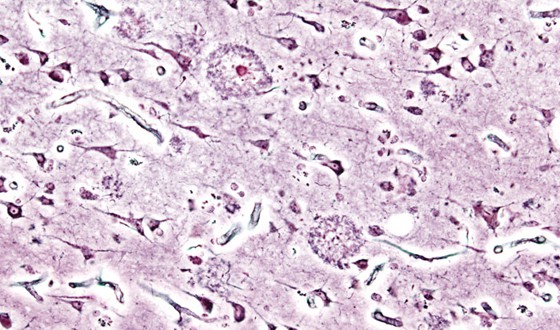
Histopathogic image of senile plaques in the cerebral cortex in a patient with pre-senile onset Alzheimer’s disease
Eli Lilly has said it intends to carry out a third phase III trial of its Alzheimer’s drug candidate solanezumab after discussing the results of its first two pivotal studies with the US FDA.
The announcement ends speculation that the company may have been able to file for approval of solanezumab in the US on the basis of data from its EXPEDITION and EXPEDITION 2 trials, which failed to meet their primary endpoints.
Lilly conducted a subgroup analysis on patients with mild Alzheimer’s from the pooled study data and found that in this population the anti-amyloid drug was able to slow cognitive decline, with the benefit confirmed by an independent analysis a few weeks later.
All told, Lilly’s drug slowed the cognitive decline in this patient group by 34 per cent, compared to 18 per cent with placebo, which was a statistically significant difference.
Lilly now says it will start a new phase III trial involving only patients with mild Alzheimer’s next year.
However, the design and duration of that trial have yet to be determined and it will likely be at least three years before an effect on Alzheimer’s progression can be demonstrated.
Investors appeared to react unfavourably to the news, even though prospects for solanezumab were practically written off after Pfizer and Johnson & Johnson’s intravenous anti-amyloid drug bapineuzumab failed its phase III trials programme.
A subcutaneous form of the latter is still in trials that won’t generate data until 2014, but the disappointment came amid a series of other amyloid-targeting drugs that failed in late-stage testing, notably Bristol-Myers Squibb’s avagacestat, Lilly’s semagacestat and Elan’s AN1792.
Lilly’s share price dropped more than 3 per cent yesterday on the announcement, although David Ricks, the head of Lilly Bio-Medicines said the company “remain encouraged and excited by the solanezumab data”.
The company also seemed to suggest in its official statement that it may be able to move ahead more quickly with marketing applications outside the US.
“Lilly will continue to analyse and discuss the data from the … EXPEDITION studies with regulators globally to determine the regulatory paths forward in different regions,” said the company.
“It is possible that different courses of action could be taken in different jurisdictions,” it added.
The effect in mild Alzheimer’s might lend credence to the notion that the amyloid pathway needs to be blocked early in the course of the disease in order to prevent amyloid plaque formation in the brain and – by extension – the neuronal damage that leads to cognitive and memory decline.
With that in mind, solanezumab’s different mode of action to bapineuzumab may stand in its favour. It binds to monomeric beta amyloid to prevent aggregation, while Pfizer and J&J’s drug attaches to already-aggregated beta amyloid and stimulates its removal.
“We believe the results demonstrating a slowing of cognitive decline in patients with mild Alzheimer’s disease treated with solanezumab are the first data from phase III clinical trials that support the amyloid hypothesis,” said Eric Siemers, senior medical director of Lilly’s Alzheimer’s programme.




